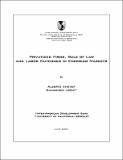| dc.description.abstract |
This paper takes advantage of a recent large firm-level dataset to compare labor indicators of privatized, private, and public firms around the world, particularly wages, benefits, labor composition, education and training, unionization, and quality of management. While labor productivity increases after privatization, the ratio of permanent workers to temporary workers also increases. Convergence depends to some degree on the quality of the institutions, namely, the rule of law. Not only is this true for the ratio of permanent workers to temporary workers, but also for education of the workforce, and for the manager’s years of experience. On the other hand, the rule of law appears to be less important in the case of labor productivity and training. |

